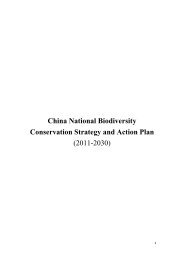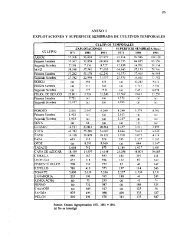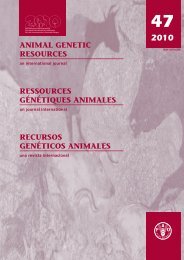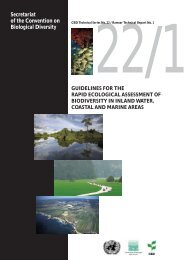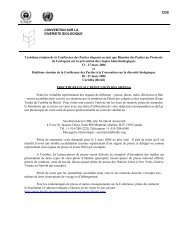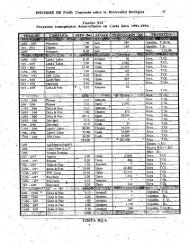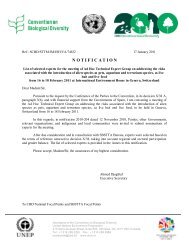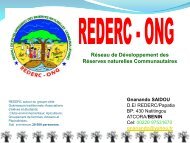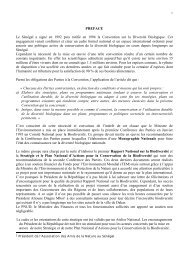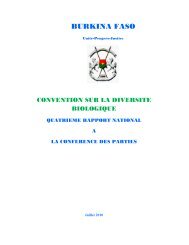English - Convention on Biological Diversity
English - Convention on Biological Diversity
English - Convention on Biological Diversity
You also want an ePaper? Increase the reach of your titles
YUMPU automatically turns print PDFs into web optimized ePapers that Google loves.
COUNTRY STUDY FOR BIODIVERSITY OF THE REPUBLIC OF MACEDONIA<br />
Table 26. Indigenous breeds and species.<br />
Species Breed Strain Status of Populati<strong>on</strong><br />
Cattle (Bos Taurus) Busha Stable<br />
Sheep (Ovis aries) Pramenka<br />
Karakachanska<br />
Ovchepolska<br />
Sharplaninska<br />
Critical<br />
Stable<br />
Stable<br />
Goat (Capra hircus) Domestic (Balkan) goat Stable<br />
Pig (Sus scrofa) Local primitive pig Unknown (critical)<br />
Dog (Canis familiaris) Sheep dog – Sharplaninets Stable<br />
Sheep dog - Sharplaninets. This indigenous breed developed in an independent,<br />
natural and authentic manner without any significant participati<strong>on</strong> by humans, which is<br />
its great advantage. Its name derives from its place of origin (the mountain massifs of<br />
Shar Planina, Bistra, Korab and Kozhuf), where the c<strong>on</strong>figurati<strong>on</strong> of the relief and other<br />
natural and geographical c<strong>on</strong>diti<strong>on</strong>s have all c<strong>on</strong>tributed to its genetic stabilisati<strong>on</strong>. Up<strong>on</strong><br />
the request of the Kinological Associati<strong>on</strong> of Maced<strong>on</strong>ia (KAM), the Federati<strong>on</strong><br />
Cynologique Internati<strong>on</strong>al (FCI) registered this animal under the name Sheep Dog –<br />
Sharplaninets. It is listed as having a dual country of origin, the Republic of Maced<strong>on</strong>ia<br />
and Serbia and M<strong>on</strong>tenegro. Today it is used both as a highly rated sheepdog for the<br />
protecti<strong>on</strong> of herds of sheep and goats from predators and as a pet animal in urban<br />
settings.<br />
4.2. Wild species of ec<strong>on</strong>omic importance<br />
4.2.1. Use of wild plants<br />
Although pastures are used in livestock producti<strong>on</strong> and represent the most important<br />
ec<strong>on</strong>omic n<strong>on</strong>-cultivated plant resource, their total productivity, which is directly<br />
influenced by seas<strong>on</strong>al climatic c<strong>on</strong>diti<strong>on</strong>s, has not been calculated to date. Most<br />
pastures are not utilised, being present in the high mountains. They are managed by the<br />
Public Enterprise for Pastures at the nati<strong>on</strong>al level. The lack of significant grazing in<br />
these pastures has c<strong>on</strong>tributed to a change in the compositi<strong>on</strong> of herbaceous vegetati<strong>on</strong>,<br />
the invasi<strong>on</strong> of woody shrubs and the degradati<strong>on</strong> of the humic layer.<br />
Other species - There are legal regulati<strong>on</strong>s (Regulati<strong>on</strong>s <strong>on</strong> the Manner of Use of<br />
Other Forest Products, Official Gazette of the Republic of Maced<strong>on</strong>ia 13/00), but they<br />
do not provide a mechanism for obtaining a precise assessment of the current status of<br />
wild plant species. Moreover, the c<strong>on</strong>cessi<strong>on</strong>aire with the right to use the particular<br />
resource has no legal resp<strong>on</strong>sibility for its management. Thus, <strong>on</strong>e of the priorities is to<br />
prepare legal regulati<strong>on</strong>s defining the sustainable use of these species, in order to prevent<br />
their disappearance. The implementati<strong>on</strong> of an organic system of c<strong>on</strong>trolled usage of<br />
biological resources, with adequate certificati<strong>on</strong> and labelling of the local products, will<br />
increase their availability in internati<strong>on</strong>al markets and, at the same time, the obligati<strong>on</strong><br />
for permanent supervisi<strong>on</strong> and c<strong>on</strong>trol.<br />
4.2.1.1. Food<br />
Species of plants intended for human c<strong>on</strong>sumpti<strong>on</strong> yield both fresh, whole, semiprocessed<br />
products (frozen, dried or dehydrated) and fully processed products (salted,<br />
pickled or preserved). Without respect to processing technique, the following groups of<br />
wild plants are of greatest ec<strong>on</strong>omic importance:<br />
77



